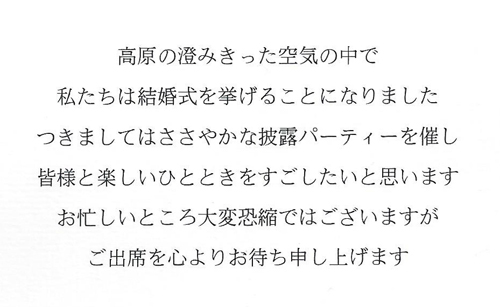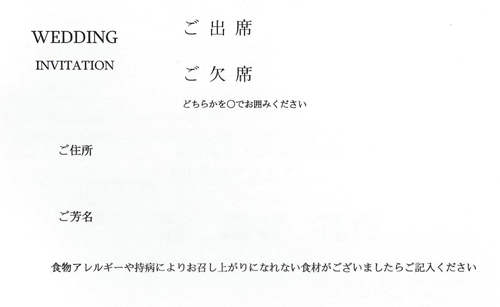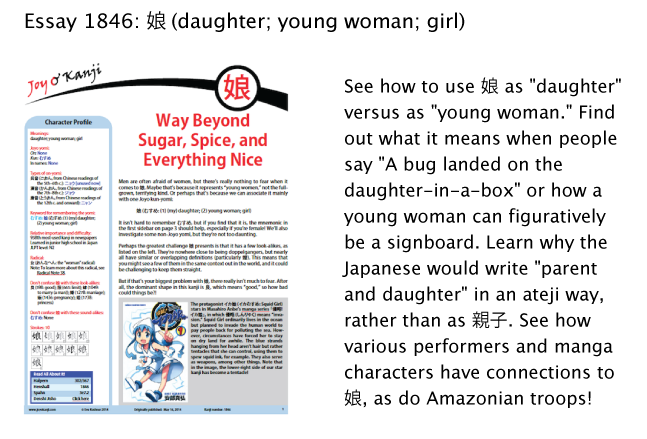Wedding Watermelon
I told you last week how excited I was to receive a wedding invitation from Japan. I can't begin to guess how long I spent scrutinizing each word. And yet, as is far too easy to do when one immerses oneself in the details of kanji, I missed the forest for the trees. Until just now I didn't notice the beautiful shape of the text:

It's a perfect ... what would we call that? An American football? A sphere with its top and bottom cropped off? A watermelon? At any rate, it must have taken ages to edit the sentences so that they would increase in length until the middle rows, then taper off again. (Apparently, this is not a customary shape for text on Japanese invitations.)
I wonder if this design goal has anything to do with the hiragana that tripped me up, as hiragana often does. That is, although quite a few more words could have appeared in kanji, they're in hiragana, making the lines stretch out just so. I know people say that hiragana come across as softer and that kanji can seem harsh. But look how kanji-rich the first line is. Surely one would want to be gentlest at the beginning for fear of scaring away potential guests.
Anyway, I didn't know what to make of these hiragana terms in lines 3 and 4:
つきましては (就きましては: in line with this; therefore)
ささやか (細やか: meager; modest)
ひととき (一時: (1) moment; a (short) time; awhile; (2) former times)
As usual, the kanji clarify matters, at least in the third case.
Of course, I struggled with some kanji terms, too, including these from lines 1 and 3:
高原 (こうげん: plateau), which I wanted to read as a place name, たかはら!
澄む (すむ: to become clear)
催す (もよおす: (1) to hold (a meeting); give (a dinner); show signs of; (2) feel (sensation, emotion, etc.))
All together, the first four lines are as follows:
高原の澄みきった空気の中で
私たちは結婚式を挙げることになりました
つきましてはささやかな披露パーティーを催し
皆様と楽しいひとときをすごしたいと思います
We have decided to celebrate our wedding
in the perfectly clear air of a plateau
We would therefore like to hold a small reception party
and to share a pleasant time with everybody
As you may recall, we examined the final two sentences last week.
The invitation came with a response form to fill out and return:

That form, too, puzzled me in many ways. For one thing, I was startled to see this word in the bottom line:
持病 (じびょう: chronic disease)
I don't remember ever coming across an English invitation that alluded to disease. In this case, guests are invited to list any ingredients they can't eat, due to allergies or chronic diseases.
If the words on this invitation surprised me, I was even more astonished to learn that the guest needs to delete some of the writing! That is, in filling out the response form, guests are referring to themselves and should not use the honorific ご- prefix. Good manners dictate that a guest cross out the instances of ご-!
Here's how it works. As the tiny writing under ご欠席 indicates, those who received the invitation should circle the word that matches their intentions: 出席 (しゅっせき: attending) or 欠席 (けっせき: not attending). That's what ◯でお囲みください means; we need to read ◯ as まる (circle) and the verb as "please encircle," coming from 囲む (かこむ). They should also strike out the ご- attached to whichever word they circled. One web page shows how this should look.
Then there's ご住所 (ごじゅうしょ: your address) and ご芳名 (ほうめい: good name; good reputation; your name). Guests need to delete the ご in both words, as well as the 芳 in the latter because the 芳 is also honorific.
As かんば•しい, 芳 means "fragrant." Now, how did 芳 wind up in such a term? Maybe the idea is to flatter potential guests by telling them they smell good!
Here's a sneak preview of the newest essay, which is on 娘:

Have a great weekend!

Comments